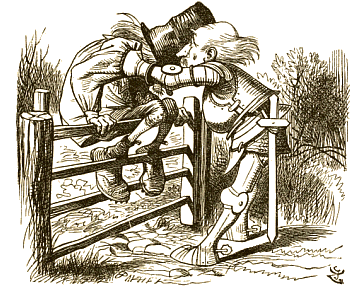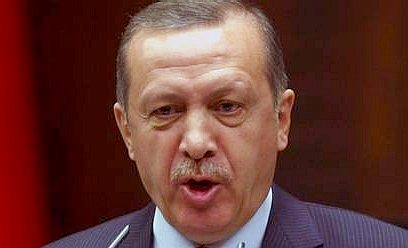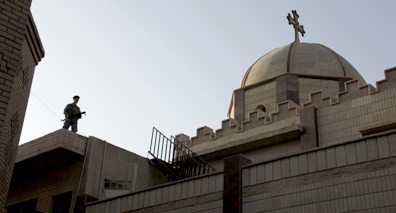This is the second installment of a four-part series. Previously: Part 1.

Keeping a Close Eye on the Right Wing
Part 2: The Transatlantic Connection
As mentioned in the introduction to this series, the International Centre for the Study of Radicalisation and Political Violence (ICSR) held a conference in London on March 13 to study the “New Far Right” in Europe, with a special focus on the English Defence League. Paul Weston has described the event as preparation of the virtual battlefield in advance of a takedown of the EDL by Prime Minister David Cameron and the British government.
Based on the conference report, “A Neo-Nationalist Network: The English Defence League and Europe’s Counter-Jihad Movement”, the EDL was indeed the major focus of the ICSR event. But was the conference convened to launch the report? Or was the report commissioned in advance to help justify a predetermined conclusion, namely that the EDL needs to be banned?
In either case, the paper fails to provide meaningful documentation of any dangerous tendencies in the English Defence League and its allies. The authors seem to be of two minds, analyzing the EDL using loaded terms, yet providing a great deal of material that is intended to be positive. The result of their efforts is a schizophrenic document.

As you will see, they pay the necessary lip service to their concerns in the form of vague misgivings about what lies behind the EDL’s actions. Despite the public endorsement by police and the official statements, they seem to feel there may yet be some sort of secret crypto-fascism behind the European Counterjihad and the EDL. Even so, the examples presented in the report are almost all quite positive, and take pains to show how much the movement overlaps mainstream political discourse.
This is important for all of us, because their insights will enable a civil discourse to be engaged on the issues and policies. It may help put aside the ad hominem attacks so beloved by extremist groups such as UAF and Antifa, and their close allies among doctrinaire Islamists such as Anjem Choudary.
If Hope not Hate, under the umbrella of ICSR, has come around to a more sensible view of Tommy Robinson and the English Defence League, then more power to them! Despite the report’s reflexive scowl at the EDL and all it represents, the actual data presented reflect quite positively on Tommy Robinson, Kevin Carroll, and the European Counterjihad.
* * * * * * * * * * * * * * *
Now let’s get down to the report itself, which has been posted as a 72-page pdf at the ICSR website. It’s too large for a complete analysis here, even in three parts, so readers are advised to download it and read the entire thing. Be warned, however: much of it is written using the mind-numbing academic jargon so typical of government-funded research papers.
As mentioned above, the report appears schizophrenic in its approach to the topic, as if it is somehow subverting the ostensible intent of the document, or as if there were two very different authors. And the report does indeed have two authors, Alexander Meleagrou-Hitchens and Hans Brun.
I don’t know anything about Hans Brun, but Mr. Hitchens (the son of the late Christopher Hitchens) seems not be a shill for the Multicultural Left. He has contributed to The Weekly Standard — hardly an organ of the Left — and is considered enough of a right-wing ideologue to merit his own Powerbase entry. In other words, he’s not someone you would expect to be viewed positively by Hope not Hate.
Although its ostensible focus is on the EDL, the report devotes more attention to activists and websites of the American Counterjihad than it does to Tommy Robinson. Pamela Geller, Robert Spencer, Gates of Vienna (blush) and other Americans and their sites receive massive coverage in this document. Try searching on “Geller”, “Atlas”, “Spencer”, “Gates”, and so on, and you’ll see what I mean.
This transatlantic focus is part of the ongoing effort by the Left to depict anti-Islamization movements in Europe as somehow instigated and/or directed by American agitators, who are seen as behind-the-scenes funders and pullers of strings for their European protégés.
My analysis below will focus mainly on those parts of the American and European Counterjihad with which I’m most familiar, which means that I will omit coverage of much of the text on the EDL. That task will be left to one of our British correspondents, and will appear as Part 3 of this report.
* * * * * * * * * * * * * * *
According to Alexander Meleagrou-Hitchens and Hans Brun, the European Counter-Jihad Movement (ECJM — I like that acronym) is spearheaded by “Defence Leagues” modeled on the EDL and coordinated by Robert Spencer and Pamela Geller from across the Atlantic. On page 24 the authors note:
The ECJM has begun to implement this model in its European operations. Defence leagues inspired by the EDL have emerged throughout Scandinavia and are organising joint rallies and conferences, helped on by so-called ‘ideas people’, including Robert Spencer, who provides much of the ideological fuel, and Pamela Geller, whose organisational skills the ECJM has employed to some effect.
And on page 52:
Above all others, two names in particular are legend within the ECJM: Robert Spencer and Pamela Geller. Through their respective blogs, Jihad Watch and Atlas Shrugs, they have helped inspire the Counter- Jihad movement in Europe.
It’s good to see credit given where credit is due. Yet the implication is that the Counterjihad in Europe lacks indigenous roots, and is largely instigated by American operatives.
How true is that?
I’ve been working every day for more than seven years with European anti-sharia activists. They were there before I joined the scene, they were there when I came onboard, and they were there when Robert Spencer and Pamela Geller first became involved in October 2007. The movement is hardly an American creation; it was and remains a spontaneous European phenomenon.
The authors may be forgiven for their misplaced emphasis on the American element, however, since such a wealth of material is available from American sources, in English. To make a proper investigation of the full range of Counterjihad activities in Europe, they would have had to read the extensive material available in Danish, Norwegian, Swedish, Finnish, German, Dutch, French, Italian, Spanish, etc. That’s a daunting task — it’s much easier to concentrate on the English-language archives of sites in the UK and the USA.
Hence the Anglocentric focus.
Taking into account the transatlantic bias, let’s see what the report has to say about the “Neo-Nationalist Network” of “Europe’s Counter-Jihad Movement”. From the Executive Summary (page 1):
While the ECJM uses tactics that are reminiscent of traditional incarnations of the European far-right, it also has a message that identifies a new and supposedly existential threat to Europe: Islam and Muslim immigration. Unlike most other far-right organisations, however, the ECJM is a one-issue movement, and has yet to show an interest in expanding its scope to cover other popular concerns. [emphasis added]
This is reasonably accurate. Yet the weasel-word “supposedly” telegraphs the Multicultural orthodoxy behind the analysis. Is the existential threat only “supposed”? Or does it really exist?
And will the authors investigate the latter possibility?
Strangely enough, and perhaps unintentionally, they do — by quoting and summarizing so much of what the “Islamophobes” have to say. They are fairly scrupulous (although somewhat superficial) in their précis of Counterjihad writings, so the existential threat may be inferred from the material they collect.
Next they discuss what they describe as “cultural nationalism”:
The ECJM is not a conventional far-right movement. While other farright strands in Europe are usually defined by their adherence to forms of racial or ethnic nationalism, the ECJM espouses an assertive cultural nationalism. Some of its views and concerns overlap considerably with those voiced by commentators on the left and right of mainstream politics. This means that taken at face-value the movement is less extreme and feels less threatening than the traditional far right, making it harder to categorise, and also allowing it to be more amorphous and transnational.
Cultural Nationalism
The authors of this report have categorised the ECJM’s nationalism as a form of cultural nationalism, according to which the nation and its citizens are defined primarily in terms of a shared culture and history. The movement’s self-proclaimed mission is to ensure the survival and prosperity of that culture, which might be represented by its fundamental principles such as free speech and equality before the law. [emphasis added]
This is actually a fair characterization of what we say. And it acknowledges something that the European Union and many national political leaders in the EU would prefer to deny: There is a common European culture, shared by the individual nations of Europe and the European diaspora. This is what we strive to preserve.
The authors obviously noticed that the values cherished by that culture and its defenders — free speech, equality before the law, etc. — are not easy to depict as scary “Nazi” characteristics. Messrs Hitchens and Brun find it “awkward” (I would have said “embarrassing”) to deal with this aspect of our movement, since to oppose us they must make common cause with murderous ideologies that consider those same values anathema.
However, we must be opposed, so that circle must be squared:
It becomes awkward to categorise a group positioning itself in defence of liberal enlightenment values as “far-right” or extreme but this report demonstrates that the ECJM’s cultural nationalism does indeed manifest itself as a form of far-right extremism in its portrayal of Muslims as a threat to European culture, an “enemy within”, and in its proposed, highly illiberal responses to this perceived threat.
In other words:
“It’s ‘awkward’ to try to square this circle and call the defense of classical liberal principles ‘far-right extremism’, but we must do it anyway: THE CIRCLE IS SQUARE.”
The defenders of free speech and equal rights for women are “far-right extremists”, because they propose (unspecified) illiberal responses to a threat that only they can perceive. Thus, they must be dangerous and pose a threat.
And what would that threat be? Three guesses:
The Threat
The ECJM poses three serious problems:
| i) |
Though it does not specifically call for violence, the sensationalist character of the ECJM narrative, which includes a paranoid tendency towards conspiracy-theory, can act as inspiration for violent terrorist attacks like those carried out by Breivik, who emerged from the ECJM’s ideological milieu; |
| ii) |
the movement can serve to incubate, protect and add a veneer of plausibility and acceptability to traditional forms of far-right xenophobia and extremism; |
| iii) |
its amorphous nature and ability to tap into popular concerns about immigration, religion, terrorism and the economy increases the likelihood of violent confrontation and jeopardises Europe’s social fabric. |
Yes, that’s right: the threat is another Anders Behring Breivik. Ever since July 23, 2011, there has been no other threat. Everyone who holds “xenophobic” opinions like ours is and forever will be a “potential Breivik”.
No evidence is required: they just know it’s true. QED.
Now it’s time to look at the dangerous, threatening, xenophobic “rock stars” of the movement: Pamela Geller, Robert Spencer, and Tommy Robinson:
Continue reading →
 A Yemeni-born woman in South Florida has been arrested for burning marks into her 17-year-old daughter’s forearms. The girl was punished for an online friendship with a boy by having identical marks burned into each arm with a heated knife. The mother is out on bail, but has been ordered to keep away from her daughter, who is staying in a shelter for victims of domestic violence.
A Yemeni-born woman in South Florida has been arrested for burning marks into her 17-year-old daughter’s forearms. The girl was punished for an online friendship with a boy by having identical marks burned into each arm with a heated knife. The mother is out on bail, but has been ordered to keep away from her daughter, who is staying in a shelter for victims of domestic violence.






